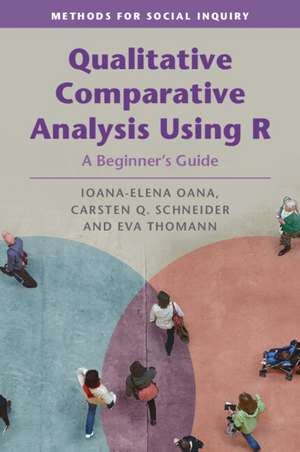Qualitative Comparative Analysis Using R: A Beginner's Guide: Methods for Social Inquiry
Autor Ioana-Elena Oana, Carsten Q. Schneider, Eva Thomannen Limba Engleză Paperback – 27 oct 2021
| Toate formatele și edițiile | Preț | Express |
|---|---|---|
| Paperback (1) | 184.64 lei 3-5 săpt. | +13.96 lei 6-10 zile |
| Cambridge University Press – 27 oct 2021 | 184.64 lei 3-5 săpt. | +13.96 lei 6-10 zile |
| Hardback (1) | 552.10 lei 3-5 săpt. | |
| Cambridge University Press – 27 oct 2021 | 552.10 lei 3-5 săpt. |
Preț: 184.64 lei
Nou
Puncte Express: 277
Preț estimativ în valută:
35.33€ • 38.37$ • 29.68£
35.33€ • 38.37$ • 29.68£
Carte disponibilă
Livrare economică 02-16 aprilie
Livrare express 18-22 martie pentru 23.95 lei
Preluare comenzi: 021 569.72.76
Specificații
ISBN-13: 9781009009935
ISBN-10: 1009009931
Pagini: 180
Ilustrații: 63 b/w illus. 26 tables
Dimensiuni: 154 x 229 x 14 mm
Greutate: 0.36 kg
Ediția:Nouă
Editura: Cambridge University Press
Colecția Cambridge University Press
Seria Methods for Social Inquiry
Locul publicării:Cambridge, United Kingdom
ISBN-10: 1009009931
Pagini: 180
Ilustrații: 63 b/w illus. 26 tables
Dimensiuni: 154 x 229 x 14 mm
Greutate: 0.36 kg
Ediția:Nouă
Editura: Cambridge University Press
Colecția Cambridge University Press
Seria Methods for Social Inquiry
Locul publicării:Cambridge, United Kingdom
Cuprins
Part I. Getting started: Introduction: QCA in a nutshell; Part II. Before the analytic moment: 2. Calibrating and combining sets; Part III. During the analytic moment: 3. Necessary conditions; 4. Sufficient conditions; Part IV. After the analytic moment: 5. Rounding up solid a QCA; 6. Post-QCA tools; 7. Summary and outlook.
Recenzii
In a relatively short, clear, and well-written textbook, the authors cover all the essentials of QCA. It includes all the current practices and developments that one needs to do a complete QCA analysis. I am using it in my QCA class and I think the students will like it. Gary Goertz, Kroc Institute for International Peace Studies, University of Notre Dame
This book is simply a must for anyone aiming at exploiting 'hands on' the distinctive analytic leverage of QCA, via the vast possibilities of the R environment. Benoît Rihoux, University of Louvain and COMPASSS global network (compasss.org)
Every now and then, a book comes along of which you think 'why wasn't this around when I was learning this stuff?'. Because sometimes, you just want to learn from the best. The authors have written an excellent guide for both first-time users and experienced QCA scholars: robust, powerful, and a must-read. Bart Cambré, Antwerp Management School
Easily accessible and loaded with a wealth of examples, this important book by Oana, Schneider, and Thomann provides an expert guide to the set-analytic perspective. The integration of concepts and research strategies with the R software package makes their approach particularly successful. I expect it will quickly become the standard introduction to QCA. Peer C. Fiss, University of Southern California
Social scientists interested in QCA should not miss this book. Oana, Schneider, and Thomann offer an introduction to QCA that is friendly, up to date, and technically advanced. The volume covers set relations, calibration of “crisp” and “fuzzy” sets, necessary conditions, sufficient configurations, temporality, advanced diagnostics, and post-QCA tools. Each chapter contains intuitive examples, advanced tips, and detailed implementation instructions in R. Aníbal Pérez-Liñán , University of Notre Dame
This book is simply a must for anyone aiming at exploiting 'hands on' the distinctive analytic leverage of QCA, via the vast possibilities of the R environment. Benoît Rihoux, University of Louvain and COMPASSS global network (compasss.org)
Every now and then, a book comes along of which you think 'why wasn't this around when I was learning this stuff?'. Because sometimes, you just want to learn from the best. The authors have written an excellent guide for both first-time users and experienced QCA scholars: robust, powerful, and a must-read. Bart Cambré, Antwerp Management School
Easily accessible and loaded with a wealth of examples, this important book by Oana, Schneider, and Thomann provides an expert guide to the set-analytic perspective. The integration of concepts and research strategies with the R software package makes their approach particularly successful. I expect it will quickly become the standard introduction to QCA. Peer C. Fiss, University of Southern California
Social scientists interested in QCA should not miss this book. Oana, Schneider, and Thomann offer an introduction to QCA that is friendly, up to date, and technically advanced. The volume covers set relations, calibration of “crisp” and “fuzzy” sets, necessary conditions, sufficient configurations, temporality, advanced diagnostics, and post-QCA tools. Each chapter contains intuitive examples, advanced tips, and detailed implementation instructions in R. Aníbal Pérez-Liñán , University of Notre Dame
Descriere
A comprehensive introduction and teaching resource for state-of-the-art Qualitative Comparative Analysis (QCA) using R software.





